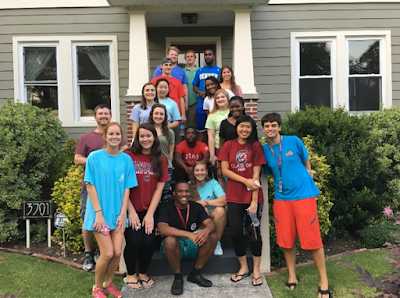Established in 2006, the Dinner Dialogues program helps create a meaningful experience for students at the University of South Carolina. For some students, it can be difficult to create connections on campus. The Dinner Dialogues program was created to offer a unique way for students and university instructors to interact throughout the semester, in a more casual atmosphere than the classroom setting. It also allows students to get off campus with their peers and have genuine conversations with the people they see two to three times a week–about more than an assignment.
Because of its terrific reputation, the program has grown from 20 Dinner Dialogues in 2006 to 117 in fall 2017. Supported by the Parents Annual Fund, professors can apply to host their undergraduate class in their home for a meal, receiving reimbursement up to $10 for each student.

These in-home dinners give students the opportunity to see their professors as normal individuals – in their homes, instead of just authority figures lecturing behind podiums. It also pushes students outside their comfort zone to interact with classmates in a new setting. These dinners always result in interesting and interactive conversations, truly engaging all parties.
Don’t just take our word for it, either! Here’s what our students had to say about the Dinner Dialogues program:
- “I felt like I was more than just a student at the university. Having dinner at her house made me feel like I have a family at USC.”
- “As a student who lives off campus and doesn’t get many opportunities to get to know my classmates and professors, I really appreciated this. I got a better understanding of the course and the professor. I felt more connected and engaged and more invested in the class.”
- 99% of students surveyed in fall 2017 were satisfied with the discussion and interaction with their instructor during the Dinner Dialogues meal.
- 96% of students surveyed in fall 2017 felt that the dinner allowed them to get to know their instructor better.
- 86% of fall 2017 attendees felt more comfortable asking questions in class or visiting their instructor’s office hours after the Dinner Dialogues meal. (Students who responded otherwise stated that they already felt comfortable talking with their instructor prior to the dinner.
Here’s what our participating instructors had to say about the Dinner Dialogues program:
- “For the first time, I scheduled the class dinner before Fall Break (as opposed to the end of the semester) and I could see how much of an impact it had on our time in the classroom for the rest of the semester.”
- “I believe having my U101 students over for dinner and a movie through Dinner Dialogues set the tone for an incredible semester. My students had such a positive experience that they began having dinner together every Tuesday/Thursday after our class. It was a pleasure to see a class bond to such an extent ... and I believe Dinner Dialogues was the impetus.”
Your institution can easily adapt this by establishing a development fund (if you don’t already have one) and utilizing funds for Dinner Dialogues-type programming. If this isn’t feasible, consider adding a line to your budget for next year to cover a few Dinner Dialogues meal and possibly increasing it a little each year with the support of grants or extra development funds. You could also look into sponsorship where local businesses fund Dinner Dialogues meals through gift cards or by providing a catered option. You can consider hosting events at restaurants and only reimbursing $5 for each student to start, then increase the reimbursable amount as the program and funding grows.
Another option for a Dinner Dialogues-type event is having a low-key dinner social for different academic departments (working together to spit the cost) where students could use those outside-the-classroom interactions with faculty most. It could be catered by dining facilities, or hosted off campus at a restaurant or event space. Dinner Dialogues is meant to help break down the seemingly unapproachable barriers that exist in a college classroom and encourage conversation, discussion, and fellowship between all parties.




